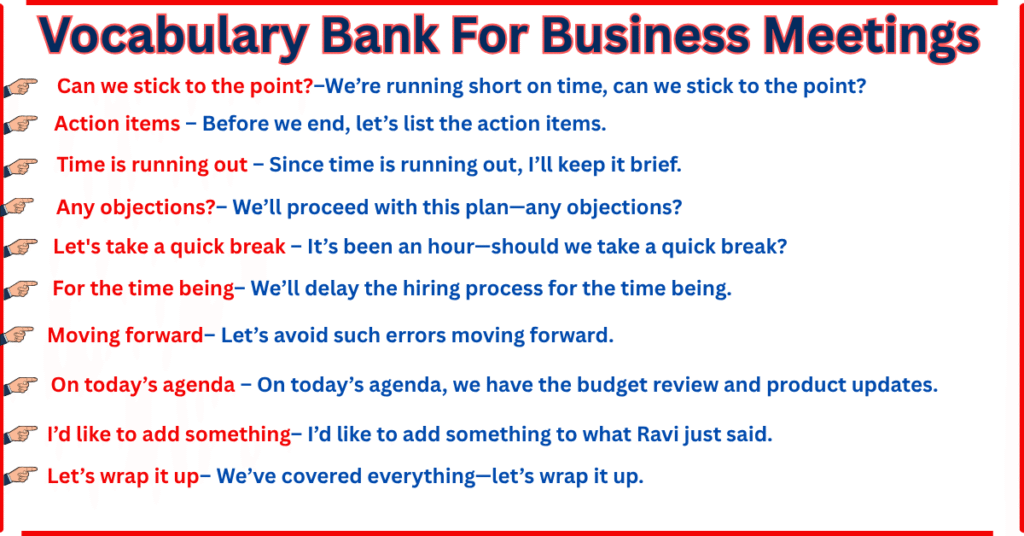Business English Vocabulary You Need to Sound Professional

Have you been striving to learn Business English for your job, but still feel nervous in meetings or interviews? Do you understand basic concepts of English but struggle when you need to use professional vocabulary at work? Don’t worry — you’re not alone. I’ve been there too, and today I you are going to get all the help you need to shine at your workplace!
You don’t just need English — you need Business English.
Let’s make this easy, friendly, and super useful. I’ll show you how to improve your business English vocabulary step by step, even if you’re a beginner. Ready? Let’s dive in!
What Is Business English?
Let’s first decode – what exactly is Business English?
It’s a type of English used in the workplace — in emails, meetings, presentations, negotiations, interviews, and more. It includes professional vocabulary that helps you sound professional, confident, smart, and fluent.
Here’s a quick example:
Casual English: “Let’s move our meeting to tomorrow. Today’s just too hectic.”
Business English: “Would it be possible to reschedule our meeting for tomorrow? I’m currently dealing with some urgent matters.”
See the difference? Same meaning — but the second one sounds more professional.
Why Business English Vocabulary Is Important
Let’s be real. If you wish to grow your career, in any organization, you need to sound clear and confident. You want your boss, co-workers and clients to understand you and respect what you convey in meetings and otherwise. And for that, you need to:
- Use professional vocabulary
- Speak fluently and confidently in meetings
- Write emails that sound professional
- Handle interviews like a pro
And ‘yes’ — you can do it, even if you’re still learning Business English!
Step-by-Step Guide: Learn Business English Vocabulary Naturally
Let’s jump into the exciting stuff! Here’s how you can build your Business English vocabulary in a fun and effective way.
1. Learn Vocabulary in Context, Not Just Lists
Many people just memorize word lists but that doesn’t help much as they tend to forget words over time. Instead, learn new words in real-life situations.
Example: Instead of just learning the word “deadline,” learn how it is used:
“We need to meet the deadline by Friday.”
“I’m working overtime to finish before the deadline.”
This way, the word stays in your mind, and you learn how to use it naturally.
2. Create Vocabulary Banks for Work Situations
Make small vocabulary banks for different office situations. Every time, you come across a situation, refer to the vocabulary bank related to that particular situation, to access relevant vocabulary. For example:
For Emails:
- “Attached is the file you requested.”
- “Please let me know if you have any questions.”
For Phone Calls:
- “May I speak with Mr. Sharma?”
- “Could you repeat that, please?”
For Meetings:
- “Let’s get started.”
- “That’s a great point.”

Use these phrases again and again — repetition will boost retention.
3. Use Business English in Daily Life
Start using Business English even outside your job. This may be tricky, in the beginning, but with practice you’ll find it fun and helpful.
For example, instead of saying:
“I’ll try to do it,” say “I’ll follow up on that.”
Or
“Let’s talk later,” say “Let’s schedule a meeting.”
Even when chatting with a friend, practice these phrases so your brain starts thinking in English for the workplace.
4. Watch Business English Videos or Podcasts
There are many free as well as paid YouTube channels and podcasts that teach Business English with examples.
Try searching:
- “Business English expressions”
- “English for office conversations”
- “Fluent English for meetings”
- “English for Business Meetings”
Watch one video or podcast daily. Pause and repeat the sentences aloud. Focus on how they speak (Pronunciation and intonation) and the words they use.
5. Speak English Fluently with Role-Play
Role-playing can be quite helpful, in your journey. Imagine yourself in a meeting, or writing an email, or giving a presentation. This practice gives wonderful results.
Talk to yourself in English:
- “Good morning, everyone. Today, I’ll present our Q2 report.”
- “Thanks for joining. Let’s begin with the agenda.”
Even 5 minutes a day helps build fluency and confidence. The best thing about this practice is – you can play all roles if you don’ find any partner to practice with you. For example- to practice ‘sales meeting with a client’ play the roles of both ‘client’ and ‘the sales person’.
6. Learn Synonyms for Common Workplace Words
Use smart alternatives to basic words. This makes you sound more fluent.
| Basic Word | Business English Word |
| Start | Initiate |
| Help | Assist |
| Say | Mention |
| Talk | Discuss |
| Try | Attempt |
Example:
“I would like to initiate the next steps for this project.”
Start using these new words, whenever possible, until they feel natural.
7. Practice with Apps and AI Tools
Use mobile apps like:
BBC Learning English – Business English section
Or practice speaking with AI tools like ChatGPT
Prompt idea:
“Can you help me practice English conversation at work about a sales review meeting?”
8. Read Business Articles or News
Start reading simple business articles, even one article a day can make a lot of difference. Look at websites like:
- BBC Business
- The Economic Times (English version)
- Harvard Business Review (simple summaries)
When you find a new word, note it down. Find the meaning and then try to use it in a sentence.
Example word: “Revenue”
“Our revenue increased last quarter.”
“We need to grow our revenue.”
That’s how your vocabulary grows — one word at a time.
9. Practice Writing Business Emails
Start writing emails — even if you don’t send them. This practice will help you use vocabulary that you learn every day. Also, if will boost your confidence.
Practice templates like:
“Dear Sir/Madam, I hope this message finds you well…”
“I’m writing to follow up on our conversation…”
Then close with:
“Best regards”
“Looking forward to your response”
Save your emails and see how you can improve them with better vocabulary.
10. Join Online Communities or Groups
Join Facebook groups, Telegram channels, or LinkedIn forums made for English learners. Many of them practice Business English daily.
Ask questions like:
“How do I say this professionally?”
“Can someone help improve my email?”
You’ll get help and make new friends who are on the same journey.
Common Business English Phrases to Get You Started
Here are 15 real-life Business English phrases you can start using today:
| Phrase | Use It Like This |
| “Think outside the box” | “We’ll need to think outside the box to solve this challenge.” |
| “As per our discussion” | “As per our discussion, I’ve updated the report.” |
| “Moving forward” | “Moving forward, we’ll use a new strategy.” |
| “On the same page” | “Let’s make sure we’re on the same page.” |
| “Take the lead” | “Can you take the lead on this task?” |
| “Keep me posted” | “Please keep me posted on any changes.” |
| “Circle back” | “Let’s circle back after lunch.” |
| “Reach out” | “Feel free to reach out if you have questions.” |
| “Ahead of schedule” | “We finished the work ahead of schedule!” |
| “In alignment with” | “This plan is in alignment with company goals.” |
| “Action items” | “Let’s list out the action items.” |
| “Deadline” | “We must meet the deadline.” |
| “Take ownership” | “I’ll take ownership of the report.” |
| “Put it on hold” | “Let’s put that idea on hold for now.” |
| “Fast-track” | “Can we fast-track this process?” |
Frequently Asked Questions (FAQs)
1. What is Business English, and why is it important?
Business English is the type of English used in professional settings, including emails, meetings, presentations, and negotiations. Mastering it helps you communicate clearly and confidently, making you stand out in your career.
2. How can I learn Business English vocabulary effectively?
Start by building a strong foundation with a Business English vocabulary list and practicing words daily. Use Business English vocabulary in use exercises to see how words fit in real business contexts.
3. Where can I find a Business English vocabulary book?
Many publishers offer Business English vocabulary books with curated words, phrases, and exercises. These books often include explanations, example sentences, and practice activities to improve retention.
4. Are there free resources for Business English vocabulary PDF downloads?
Yes! You can find Business English vocabulary PDF files online containing lists of words, their meanings, and sample sentences. These are great for offline study and revision.
5. What are some essential Business English vocabulary words with meaning?
Important Business English vocabulary words with meaning include terms like stakeholder, revenue, synergy, KPI, leverage, and benchmark. Understanding these helps you participate in professional discussions confidently.
6. How can I practice Business English vocabulary exercises?
You can use online quizzes, flashcards, and interactive apps. Business English vocabulary exercises help you memorize words and phrases by putting them into sentences and scenarios that mimic real workplace situations.
7. How do I use Business English phrases in real conversations?
Focus on business English phrases like “touch base,” “on the same page,” or “circle back.” Try incorporating them in emails, meetings, and presentations. Practicing with a mentor or language partner helps you sound natural.
8. What is the difference between general English and Business English vocabulary?
General English focuses on everyday communication, while Business English vocabulary includes professional terms, industry-specific jargon, and formal phrases. Using the right vocabulary can make you appear more competent in your workplace.
9. Can I use a Business English vocabulary list to prepare for interviews or meetings?
Absolutely. A well-prepared Business English vocabulary list equips you with the right words and phrases to express ideas clearly, answer questions confidently, and leave a professional impression.
10. How can I remember and use new Business English vocabulary in real life?
Regular practice is key. Use your Business English vocabulary in use by writing emails, making presentations, and speaking with colleagues. Combining books, PDFs, and Business English vocabulary exercises ensures you retain and apply new terms effectively.
Conclusion:
Learning Business English is not about using high-sounding words. It’s about clear, confident and effective communication. And guess what? You don’t need to be perfect. You just need to keep practicing, keep improving, and keep going. If you persist, you will eventually get there.
Here’s what I suggest:
- Talk to yourself in Business English daily even when you are not at the workplace.
- Use flashcards or apps to review words and use them whenever you can.
- Practice out loud — don’t just read to boost your confidence.
- Celebrate small wins — even one new word per day matters! In fact, it is an effective strategy, for long-term.
You Can Do This!
I know it feels hard sometimes. You might feel shy, nervous, unsure or even tired. But I promise — if you use even 2-3 of these tips every day, you’ll see real change.
People will listen to you more, your emails will sound more impactful, and you’ll feel more confident in your workplace.
Remember — you’re not just learning English. You’re learning Business English that gets you noticed and takes you closer to your dreams.
Therefore, go ahead, speak up, write better, and take that next step in your career. All the best wishes for your bright future!
Share your thoughts:
In this post, I have tried my best to convey my thoughts in the simplest way. Now, it’s your turn. Let me know if you have any question or concern. Also, share your learning journey that can inspire many. Don’t forget to subscribe to our blog for more tips, resources, and updates.
I create content to make English learning simple and practical. If you find it helpful, consider supporting me Your contribution helps me improve my skills and bring better content for you.




Please let me know if you’re looking for a author for your weblog. You have some really great articles and I believe I would be a good asset. If you ever want to take some of the load off, I’d love to write some content for your blog in exchange for a link back to mine. Please send me an email if interested. Cheers!
Sure! Will let you know when I need your services. Thank you for your feedback!